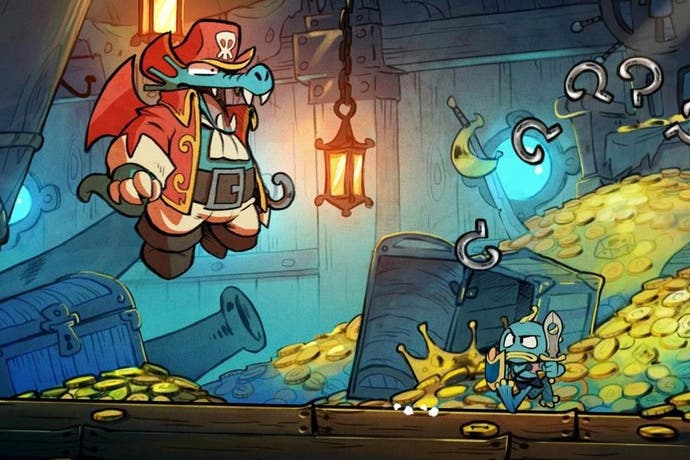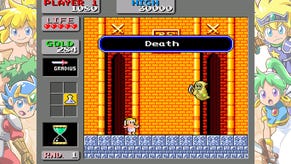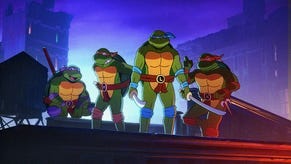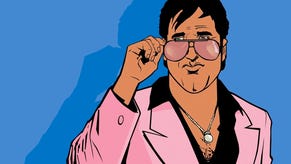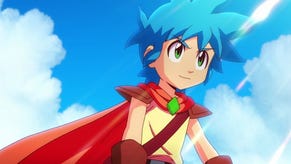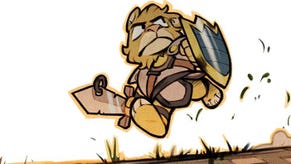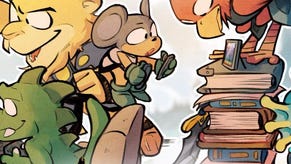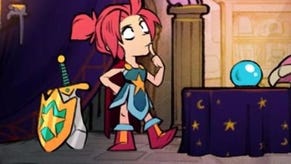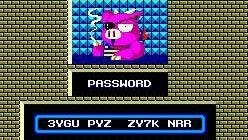Once upon a time, Wonder Boy: The Dragon's Trap was my Zelda
Proceed with your adventurous undertaking.
West One still works with the new version of Wonder Boy: The Dragon's Trap. I was expecting as much, but it was a relief anyway. This most loving of remakes would not have felt entirely legitimate if West One had not worked.
But here's something crazy: West111111 still works, too. And this is something I was not expecting. In my childish way, I had assumed that almost nobody else really knew about West111111. I had assumed it was my secret - a thing that I shared with the game itself and with an old friend I had when I was eleven.
West One and West111111 are both codes. More accurately they are WE5T ONE and WE5T 111 111, since the alphabet The Dragon's Trap provides opts for a 5 that doubles as an S. At school - The Dragon's Trap was the great love of my first year of secondary school, which would make this 1990 - my friend Gareth and I had heard rumours about a code for the game's password screen which took you almost to the end of this huge, sprawling adventure. This code was weird, we had heard: there was something not quite right about it. After all, the third Wonder Boy outing is a game in which you rarely play as Wonder Boy himself. The dragon has cursed you and so you play as the various creatures Wonder Boy has been transformed into: a lizard, a mouse, a lion, a hawk, a...um...merman? This code, though, this magical code dropped you into the endgame and gave you a tonne of gold and gear, but it also made you play as Wonder Boy - at least until you found a transformer room. Like I said, the code was weird.
And the code, someone had told me, was West One. Gareth and I did not know that The Dragon's Trap had been made by a developer called Westone, but we didn't really need explanations anyway. West One sounded cartographical; it sounded like coordinates or instructions for finding treasure: go west, but only go west one square. The day someone told us the code we pretty much ran home from school at 3.30 and rushed to Gareth's bedroom, where his Master System was waiting. We had only heard the code spoken aloud, and so we typed it in like this: WE5T 1.
Nothing happened. We thought about this. We retyped it. We turned the machine off and restarted it. We typed it again. We turned the machine off and removed and replaced the cartridge. Then we tried it again. Eventually we started typing extra 1s on at the end.
"Didn't you notice," said a boy named Bruce the next day during French, "that there were three spaces after the first four spaces on the password screen? Didn't that make you think it should be O-N-E, not 1?"
We had not noticed this, of course. But it didn't matter. We didn't find that secret door to the endgame. Instead, we had found something weirder. Type in enough extra 1s and you discover that WE5T 111111 takes you to a point about halfway through the game. It gives you a decent enough amount of gold and a handful of items from the game's armoury of swords and weapons. And it still drops you in as Wonder Boy. West One made sense as a sort of developer debug code: a gateway that took the designers to the end of the experience. West 111111 was much harder to fathom, though. It was mysterious - and it was ours.
The Dragon's Trap was ours, to be honest. The Dragon's Trap was the first game to truly blow my mind, I think. It came at a pivotal moment: I was moving from one school to another, at the same instance in history that the UK games market was shifting from stuff like the Commodore 64 to other stuff like the Master System and the NES. More than that, though, The Dragon's Trap was just a strange, mysterious, boundless game. It played a trick that, in retrospect, seems extremely simple, but at the time it really did blow my mind. The Dragon's Trap looked and behaved like a platformer. You jumped on floating ledges, you avoided enemies in real time. But it had loot. It had a sort of in-game economy with shops and hospitals and treasure chests. More than anything, though, it was a platformer where the world didn't just scroll left to right. It was a platformer in which you could go anywhere.
This still feels like magic to me. In the platformers I had played up until now, falling off the screen was definitely a bad thing to do: falling off the screen killed you. In The Dragon's Trap, however, falling off the screen takes you to another screen that is presumably sat below the first screen. Falling into water drops you into the ocean. Flying into the sky may reveal hidden doorways in the clouds. Everywhere you can get to, there is game waiting for you.
I still get a tingle of excitement every time I arrive in the small town that stands, you will eventually come to realise, at the very centre of this complex world, deserts, jungles, underground palaces and beaches fanning out in every direction like the points on a compass. The Dragon's Trap makes me think of compasses - and of maps, of exploration and adventure. It makes me think of secrets: gateways that take you to places nobody else really knows about.
What I understand now, rather prosaically, is that The Dragon's Trap is a genre hybrid: it is an RPG structure delivered with platforming traversal and combat. Still, this does not quite dull the magic of it, thankfully. It does not blunt the effect that The Dragon's Trap had on other platformers at the time. Psycho Fox was pretty good, wasn't it? It was great. But when you fell off the screen in Psycho Fox, you didn't land somewhere else. It lacked The Dragon's Trap's integrity.
The Dragon's Trap is that special kind of game that ruins other games. And yet playing it afresh, with beautiful cartoon art delicately overlaying the original chunky pixels and flat colours, this does not feel like a game whose reputation rests solely on the sad fact that it renders other games less enjoyable. If you grew up in a certain time in the UK, before Nintendo had got its act together over here and while Sega still dominated, The Dragon's Trap was probably your Zelda: an adventure that took you further from home than you would have imagined possible, that offered a landscape that was sprawling and bright and worth scouring for secrets.
